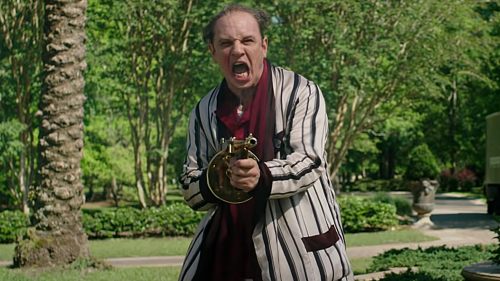SXSW 2018 Review: WON’T YOU BE MY NEIGHBOR Is The Documentary America Needs Right Now
“Love isn't a state of perfect caring. It is an active noun like struggle. To love someone is to strive to accept that person exactly the way he or she is, right here and now.”---Fred Rogers
“When I say it's you I like, I'm talking about that part of you that knows that life is far more than anything you can ever see or hear or touch. That deep part of you that allows you to stand for those things without which humankind cannot survive. Love that conquers hate, peace that rises triumphant over war, and justice that proves more powerful than greed.”---Fred Rogers
February 19th, 1968 was the first day that Mr. Rogers strolled through his front door singing sweetly over the melodic sounds of a piano, and in a loving manner, asked television audiences across the country: “Won’t you be my neighbor?” Fifty years later, Fred Rogers is still remembered as one of the most important faces in the history of children’s television. Since many of us grew up with Mister Rogers’ Neighborhood, the perception of him - along with the methods of his show - are primarily interpreted through the eyes of a child. Oscar-winning director Morgan Neville (20 Feet From Stardom) highlights Rogers’ singular ability to capture preschool audiences while discussing serious subject matter such as death, divorce, and racism. Revisiting the life of Fred Rogers and his reserved yet rebellious approach to transparent childhood education is immensely fulfilling to finally view through an adult lens. Neville’s documentary successfully circles back to the core of Rogers’ idealism through lessons of love, kindness, and acceptance while also re-introducing us to a neighbor many did not know on an adult level.
Fred Rogers’ legacy and educational impact is disclosed throughout the ninety-three minute documentary by way of archival footage and interviews with family, colleagues, and the man himself. Animation sequences weave in and out of old episode clips and interviews emphasizing his life as a youth and how he carried that mentality with him as an adult. His ability to empathize with others resonated from a young age since he suffered from many illnesses as a child including Scarlet Fever, and had to entertain himself primarily while confined to bed. Puppetry and music became his escape and a means to express feelings such as fear, sadness, and anger that otherwise were not readily accepted in his religious household. Children would regularly bully him in his youth because of his weight, which he eventually channeled into acceptance of all body types and backgrounds later in his show. The puppets used in Mister Rogers’ Neighborhood embodied people close to him in his life; and the tiger named Daniel is said to have mirrored Rogers directly. Therefore, Neville utilizes the image of Daniel to discuss Rogers on a personal level and how his childhood experiences shaped him into the cardigan-wearing, soft-spoken man we all grew to admire.
Claiming that one does not need to dress up as a clown to be entertaining, Rogers practiced a patient, honest approach that is more philosophical than most of us realize. Initially on track to become an ordained minister, he switched gears after witnessing television programing that was anything but intellectually stimulating. The concept of acceptance and being a good neighbor echoed values from the Bible, although he never praised one religion over another. He believed that television could build a community instead of dumbing down the masses or speaking to children as if they cannot understand a concept ... or shielding them from one altogether.
His bravery is exhibited throughout the duration of his thirty years on air and thoughtful morals are mentioned in each of his 895 episodes. The week Mister Rogers’ Neighborhood premiered, Robert F. Kennedy was assassinated, and Rogers had zero hesitation in utilizing his show as a platform to discuss the horrors currently happening in the world. The courageous decision to address the meaning of assassination and explain it in blunt, transparent terms to a child audience was revolutionary. While many parents protect their children from death, Rogers realized that by exposing them to the truth and clarifying it in terms they can understand, there can be a sense of ease and safety while navigating the destruction from the news. The documentary also expands on his value of inclusivity and interaction. Visiting children’s hospitals, schools, and responding to letters written by viewers were a regular occurence. One child in particular named Jeffrey Erlinger - who suffered from a tumor growing dangerously close to his spinal cord and causing him to be bound to a wheelchair - was invited on the show in which the two sang “It’s You I Like” in order to bring awareness to multiple issues children face while also displaying compassion and acceptance towards those who may look different.
Each interview in the documentary recaps fond, insightful, and comical memories of Rogers while highlighting the progressive ideas that challenged the cultural norms of the day. One impactful story stands out during segregation, when a man poured chemicals into his swimming pool intentionally causing African Americans to jump out of the water. In order to translate this into the mind of a child and turn it into a lesson of love, Rogers did a segment where he sticks his feet in a small pool of water. He then invited Mr. Clemmons, the neighborhood police officer who is also African American, to join him in soaking his feet in the pool as well--the two sitting side-by-side. The camera does a close-up while they discuss the many ways you can say “I love you” to someone you care about. There is abundant archival footage revealing how he brought the basis of kindness back, reminding us about the simplicities of life and how transformative these open-hearted, open-minded gestures can be both for an individual,-- and well, your neighbor. However, his religious doctrine did intervene as Clemmons is homosexual. While this did not bother Rogers, he maintained that Clemmons could not publicly display his true sexual identity while he was working on the show.
The documentary is multi-faceted and reveals little quirks about Mister Rogers’ personality. His family discusses how he joked around, never raised his voice in anger, and even maintained a weight of 143 pounds because the letter ‘I’ is one letter, ‘love’ is four, and ‘you’ is three. He literally personified love in every capacity, which is pretty astonishing to witness and to hear from those closest to him. Additionally, as Neville points out, Rogers utilized his passion to fight for the continued funding of the Corporation of Public Broadcasting. Expressing the need for childhood educational programming, he challenged the Senate to reinstate the $20 billion that was at risk of being cut. After a six minute testimonial, he won over the Subcommittee Chairman, Senator John Pastore’s opinion to keep its funding and continue his work.
Neville perfectly captures the essence of Fred Rogers while also addressing the controversy around a man who many think is too saintly to be real (and yes, he mentions that sniper rumor, as well). The editing, choice of footage, and animation all culminate to produce a heartwarming documentary that reminds us of the values Rogers held dear, values many of us have lost. The skepticism around his methods and other endeavors that weren’t as well received are noted, as many blame Rogers for the stereotypical, entitled mentality of millennials. Neville approaches this perspective respectfully and delicately, while never dismissing the profound impact Rogers had on multiple generations and television programming.
Fred Rogers was born on 3/20/1928, and today would have been his 90th birthday. While I absolutely adore this documentary and think everyone and their child should see it, I also want to leave you with a little something in memory of a man who made the world a better place and encouraged us to not only love ourselves, but to love our neighbors, as well.



